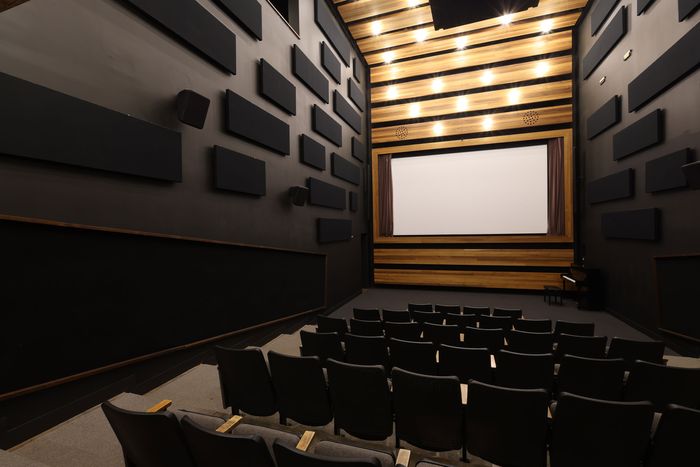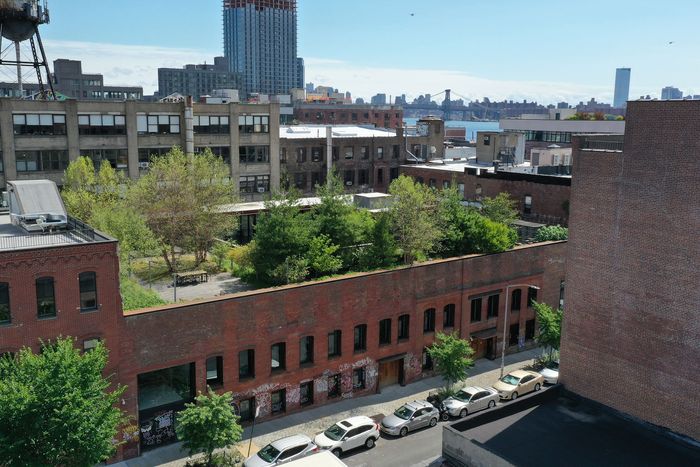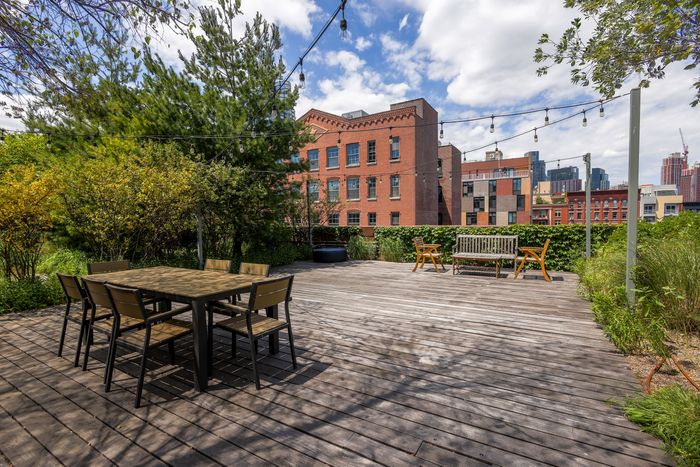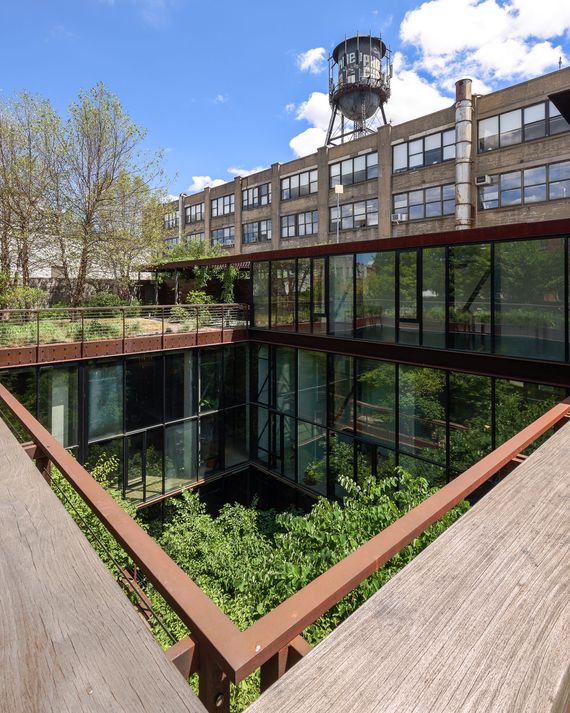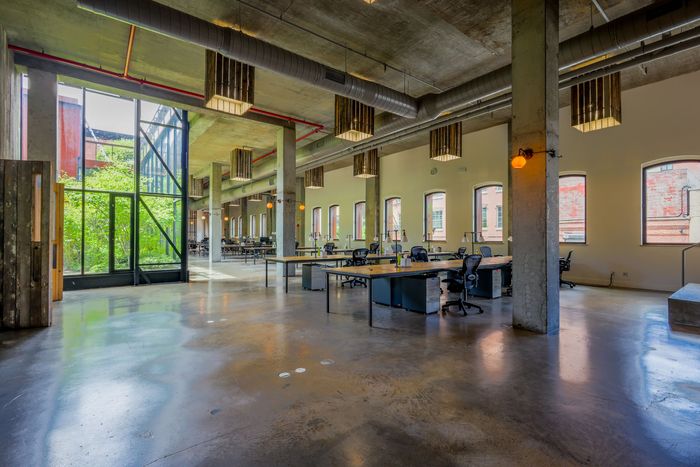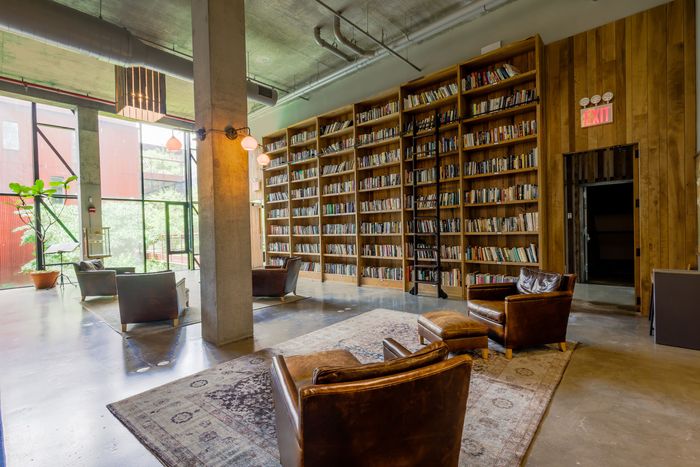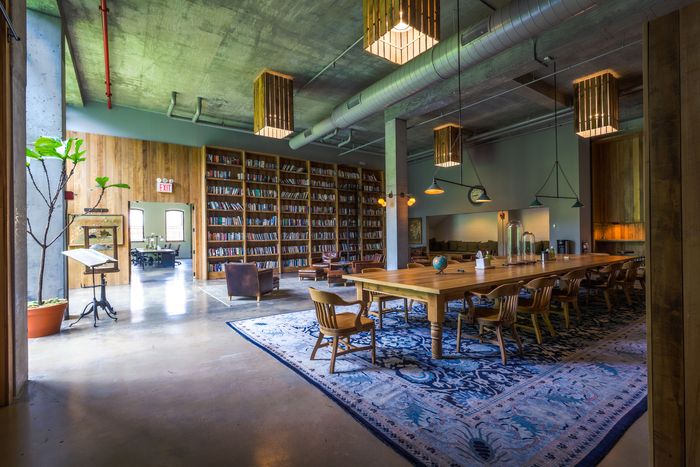
The 2,500-square-foot “library” of Kickstarter’s headquarters in Greenpoint, where employees were encouraged to work if they wanted quiet time. Architect Ole Sondresen used reclaimed wood where he could and exposed the industrial skeleton of what was here: a pencil factory.
Photo: Shug Dula
There were arcade games, staff lunches, and a library with study carrels. There was a vegetable garden on the roof, a turntable with vinyl, and a theater that seated 74. There were leather chairs, Adirondacks, and insulation made partly from recycled jeans. A dog named Jelly had run of the grounds, and designer Camille Finefrock landscaped a courtyard to resemble “a portrait of the woods,” as she told Wallpaper. “At any time in the year, people can look through the window and connect to what’s happening in nature.”
Kickstarter’s former headquarters was one of the most enviable, if not the most enviable office in the amenity wars of Obama-era Brooklyn. And now, look how far we’ve come: The building is now on the market. The listing demotes the 29,000-square-foot space from its 2010s status as an example of where office design was heading to its contemporary state as a fossil of how we once worked, an industrial ruin much like the Eberhard Faber Pencil Factory that once occupied it.
The theater was built with reclaimed wood, but perhaps that couldn’t distract from the fact workers were stuck at work to watch movies.
Photo: Shug Dula
Kickstarter made the decision to go remote forever in the last quarter of 2021 and gave its 100 workers stipends to outfit home offices or rent their own spaces. “It’s just a moment of introspection for all of us,” said former CEO Aziz Hasan. “The pandemic has deeply done that.”
The pandemic may have killed the office as we knew it, but post-Google attempts to woo millennials like me had been fizzling out for years, certainly by 2018, when I arrived at a perk-encrusted office just downriver. The Vice Media headquarters in Williamsburg featured a roof garden, seltzer on tap, and the odd band playing in the lobby with free Vice-brand beer. But the beer tasted like dirty floor, I was too busy to lounge on the roof garden, and even the endless parade of snacks started to taste sucked out of their flavor, as lifeless as the stale office air.
In the end, the cheap perks couldn’t distract from costly layoffs, dumb management decisions, or a complete lack of vision. Speaking of which: There’s no actual data to show open, flexible offices made us more creative workers or more productive. As Kickstarter employees told The Verge, they were actually annoyed by some of the office innovations, which included “people dressed up as dinosaurs for a week to wander through the office making animal noises.” Meanwhile, the company that earns 5 percent of every dollar it raises saw fewer users post new projects during the pandemic and more competition from other crowd-funders. It weathered those tough years with another round of funding but also by laying off and buying out some of the same workers it had once tried to charm with Adirondack chairs.
This sale will likely help the company’s cash flow. Unlike most tech start-ups, which rent their spaces, Kickstarter made the savvy decision to buy, investing $7.5 million of a $10 million venture round to buy and renovate the building. And it did that just two years after its founding, which turned out to be perfect timing. One year after it signed the deed, the first season of Girls made the neighborhood aspirational and Transmitter Park opened down the street, as Bloomberg’s ferries started depositing curious Manhattanites at the company’s doorstep. Even with the price cut, the company stands to make a $17.5 million profit.
It seems unlikely that the next tenant is a cash-rich tech start-up, if those even still exist. Broker Bryan Kirk said he’s been showing it to conventional commercial real-estate investors and also to clients who are interested in opening an event space or an art gallery. “We have been showing to a wide range of buyers,” he said. Though that doesn’t include anyone flipping the office to become another Greenpoint luxury condo. “This will stay a commercial use.”
58 Kent Street in Greenpoint is the former home of an Eberhard Faber Pencil factory and was landmarked when the space was bought in 2011 by Kickstarter. The renovation didn’t attempt to restore 19th-century grandeur but rather to preserve what was there, including graffiti.
Photo: Shug Dula
Designer Camille Finefrock told Wallpaper in 2014 that she wanted the roof to “evoke the feeling of what would have been in this spot on Long Island hundreds of years ago.” She used native plants and turned part of the roof into a vegetable garden.
Photo: Shug Dula
Architect Ole Sondresen brought light into the core of the building by cutting out a central courtyard, which he glassed in from the elements — a modern take on the panopticon.
Photo: Shug Dula
The building was stripped down to its industrial core and built back up with environmentally friendly materials. The walls were insulated with used denim and the doors built of reclaimed wood, and Sondresen told Curbed he believed that about half of the construction materials were sourced within 20 miles.
Photo: Shug Dula
Leather armchairs, a library ladder, and actual books present the illusion of a library, but it was just an office: an employee told Business Insider that this is where workers came when they needed to concentrate in quiet.
Photo: Shug Dula

